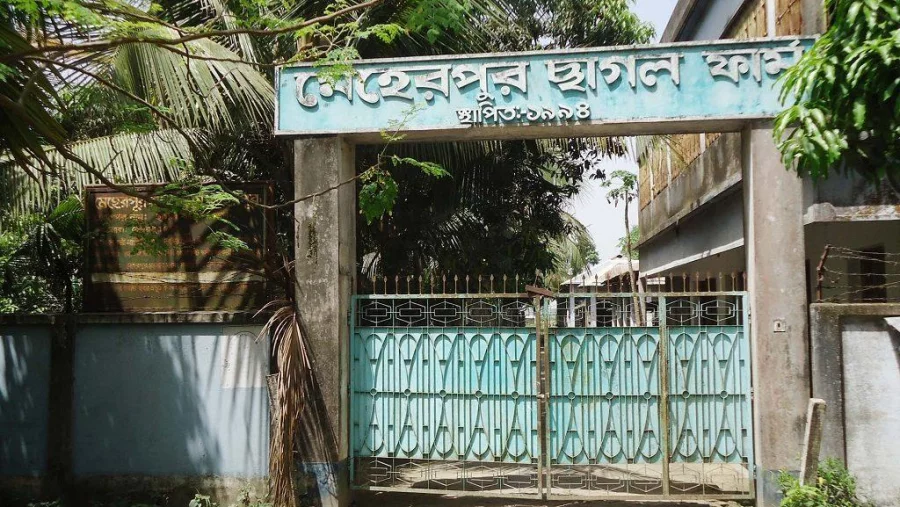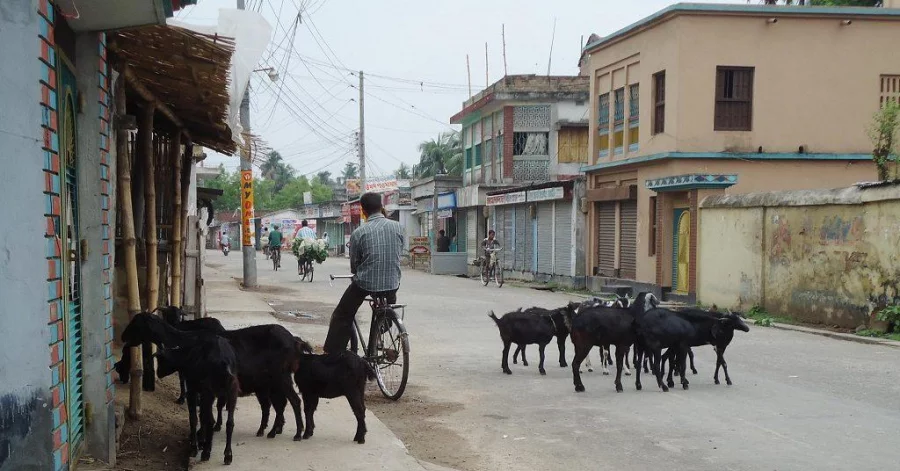The Black Bengal goat is Meherpur’s most important livestock.
Known as the poor man’s cow, the goat is the greatest earner for the people of the country who live under the poverty line. Meherpur’s Black Bengal Goats are especially famous for their delicious, ample meat and thick hide, with the latter being a prime product in the international market.
In order to increase the number of this special species of goat, Bangladesh Rural Development Board with funding from the Japanese government established a goat breeding farm on the outskirts of Meherpur town in 1994.
For a couple of years, this farm was very active with a sizeable number of goats and a regular thoroughfare of Japanese scientists and specialists who brought in special goats from Japan. However, the locals were under the misconception that the Japanese were trying to destroy the Black Bengal goat bloodline. This led to a gradual decline of interest in the project among locals until the farm went defunct.
For generations, the Black Bengal has been an important supplier of meat, milk, and leather. Meherpur’s neighbouring district Chuadanga has made this goat their district mascot. A social welfare organization called Wave Foundation has been promoting the breeding of goats by suggesting possible ways of increasing income in the process.
With assistance from Ifad and the Palli Karma Sahayak Foundation, the organization has enabled 6,000 families in Meherpur district to become self-sufficient by breeding goats using machans. The Black Bengal has brought economic solvency to these 6,000 families. Their project also helps in the promotion of these goats by informing the stakeholders of opportunities for profit and expansion.
As a result of this, the venture is known as a value-chain development project – which means that it seeks the profit of all the organizations associated with it. Since its inception in 2015, it has helped curb the mortality rate of goats by training 5,250 farmers, 25 fodder and medicine dealers, 25 merchants and butchers, 25 grass farmers, and 20 rural vets.

Meherpur's defunct goat farm
Dhaka TribuneAccording to the District Livestock Office, 60,000 families in the district are breeding goats. At present, families facing extreme poverty, families under the poverty line, and small entrepreneurs are breeding an annual average of 1, 2, and 3 goats each respectively. 80% of the women of these families are involved in the rearing of goats, and are raking in an average of around Tk6,000-7,000 per goat annually.
These goats also have the ability to give birth to a large number of offspring, have a low appetite, and require low maintenance. As a result, they have been bred in Bangladesh for generations.
Five hundred members of this project have been given Tk2,000 each to encourage them to breed goats using the machan technique. The project has also given economic support to 15 families living in extreme poverty to help them raise Black Bengal wethers.
District Livestock Official Md Abdul Aziz Al Mamun said: “Black Bengals are found all over the country. It is the only breed of goats we have. One female goat gives up to 1.5 litres of milk daily for a period of three months at a time. The milk contains 4.5% fat, 3.5% protein, 5.2% lactose, with 16% of it consisting of minerals.”
“Under proper management, each goat gives birth to three to four kids each time. To fulfil the requirements of Eid-ul-Azha, 45% of the families in Meherpur breed at least one goat. There are a total of around 28,530 farmers in the district who breed goats for business purposes, with a total of approximately 305,500 goats at present,” he added.

Goats move about freely in Meherpur town
Dhaka TribuneThe story of Noori the goatherdNoorjahan aka Noori of Meherpur’s Gangni upazila lost the use of her right hand from a disease shortly after giving birth to her fifth child and was subsequently divorced by her husband. With nothing but one chicken that she received from her family, she began her struggle for survival.
With manual labour as her primary income, Noori saved the money she earned from the sale of eggs and bought a goat with it. With time and relentless effort, Noori now owns 51 goats and four cows, and has even leased 10 bighas of land.
Without any assistance from non-government agencies, Noori has made herself not only self-sufficient, but an example of the possibilities of hard work and the opportunities that arise from goat breeding. She is revered by the locals and seen as a role-model.
When asked about her future plans, she said that she wants to set up her own goat farm.
 Meherpur's defunct goat farm Dhaka TribuneAccording to the District Livestock Office, 60,000 families in the district are breeding goats. At present, families facing extreme poverty, families under the poverty line, and small entrepreneurs are breeding an annual average of 1, 2, and 3 goats each respectively. 80% of the women of these families are involved in the rearing of goats, and are raking in an average of around Tk6,000-7,000 per goat annually.
These goats also have the ability to give birth to a large number of offspring, have a low appetite, and require low maintenance. As a result, they have been bred in Bangladesh for generations.
Five hundred members of this project have been given Tk2,000 each to encourage them to breed goats using the machan technique. The project has also given economic support to 15 families living in extreme poverty to help them raise Black Bengal wethers.
District Livestock Official Md Abdul Aziz Al Mamun said: “Black Bengals are found all over the country. It is the only breed of goats we have. One female goat gives up to 1.5 litres of milk daily for a period of three months at a time. The milk contains 4.5% fat, 3.5% protein, 5.2% lactose, with 16% of it consisting of minerals.”
“Under proper management, each goat gives birth to three to four kids each time. To fulfil the requirements of Eid-ul-Azha, 45% of the families in Meherpur breed at least one goat. There are a total of around 28,530 farmers in the district who breed goats for business purposes, with a total of approximately 305,500 goats at present,” he added.
Meherpur's defunct goat farm Dhaka TribuneAccording to the District Livestock Office, 60,000 families in the district are breeding goats. At present, families facing extreme poverty, families under the poverty line, and small entrepreneurs are breeding an annual average of 1, 2, and 3 goats each respectively. 80% of the women of these families are involved in the rearing of goats, and are raking in an average of around Tk6,000-7,000 per goat annually.
These goats also have the ability to give birth to a large number of offspring, have a low appetite, and require low maintenance. As a result, they have been bred in Bangladesh for generations.
Five hundred members of this project have been given Tk2,000 each to encourage them to breed goats using the machan technique. The project has also given economic support to 15 families living in extreme poverty to help them raise Black Bengal wethers.
District Livestock Official Md Abdul Aziz Al Mamun said: “Black Bengals are found all over the country. It is the only breed of goats we have. One female goat gives up to 1.5 litres of milk daily for a period of three months at a time. The milk contains 4.5% fat, 3.5% protein, 5.2% lactose, with 16% of it consisting of minerals.”
“Under proper management, each goat gives birth to three to four kids each time. To fulfil the requirements of Eid-ul-Azha, 45% of the families in Meherpur breed at least one goat. There are a total of around 28,530 farmers in the district who breed goats for business purposes, with a total of approximately 305,500 goats at present,” he added. Goats move about freely in Meherpur town Dhaka TribuneThe story of Noori the goatherdNoorjahan aka Noori of Meherpur’s Gangni upazila lost the use of her right hand from a disease shortly after giving birth to her fifth child and was subsequently divorced by her husband. With nothing but one chicken that she received from her family, she began her struggle for survival.
With manual labour as her primary income, Noori saved the money she earned from the sale of eggs and bought a goat with it. With time and relentless effort, Noori now owns 51 goats and four cows, and has even leased 10 bighas of land.
Without any assistance from non-government agencies, Noori has made herself not only self-sufficient, but an example of the possibilities of hard work and the opportunities that arise from goat breeding. She is revered by the locals and seen as a role-model.
When asked about her future plans, she said that she wants to set up her own goat farm.
Goats move about freely in Meherpur town Dhaka TribuneThe story of Noori the goatherdNoorjahan aka Noori of Meherpur’s Gangni upazila lost the use of her right hand from a disease shortly after giving birth to her fifth child and was subsequently divorced by her husband. With nothing but one chicken that she received from her family, she began her struggle for survival.
With manual labour as her primary income, Noori saved the money she earned from the sale of eggs and bought a goat with it. With time and relentless effort, Noori now owns 51 goats and four cows, and has even leased 10 bighas of land.
Without any assistance from non-government agencies, Noori has made herself not only self-sufficient, but an example of the possibilities of hard work and the opportunities that arise from goat breeding. She is revered by the locals and seen as a role-model.
When asked about her future plans, she said that she wants to set up her own goat farm.
